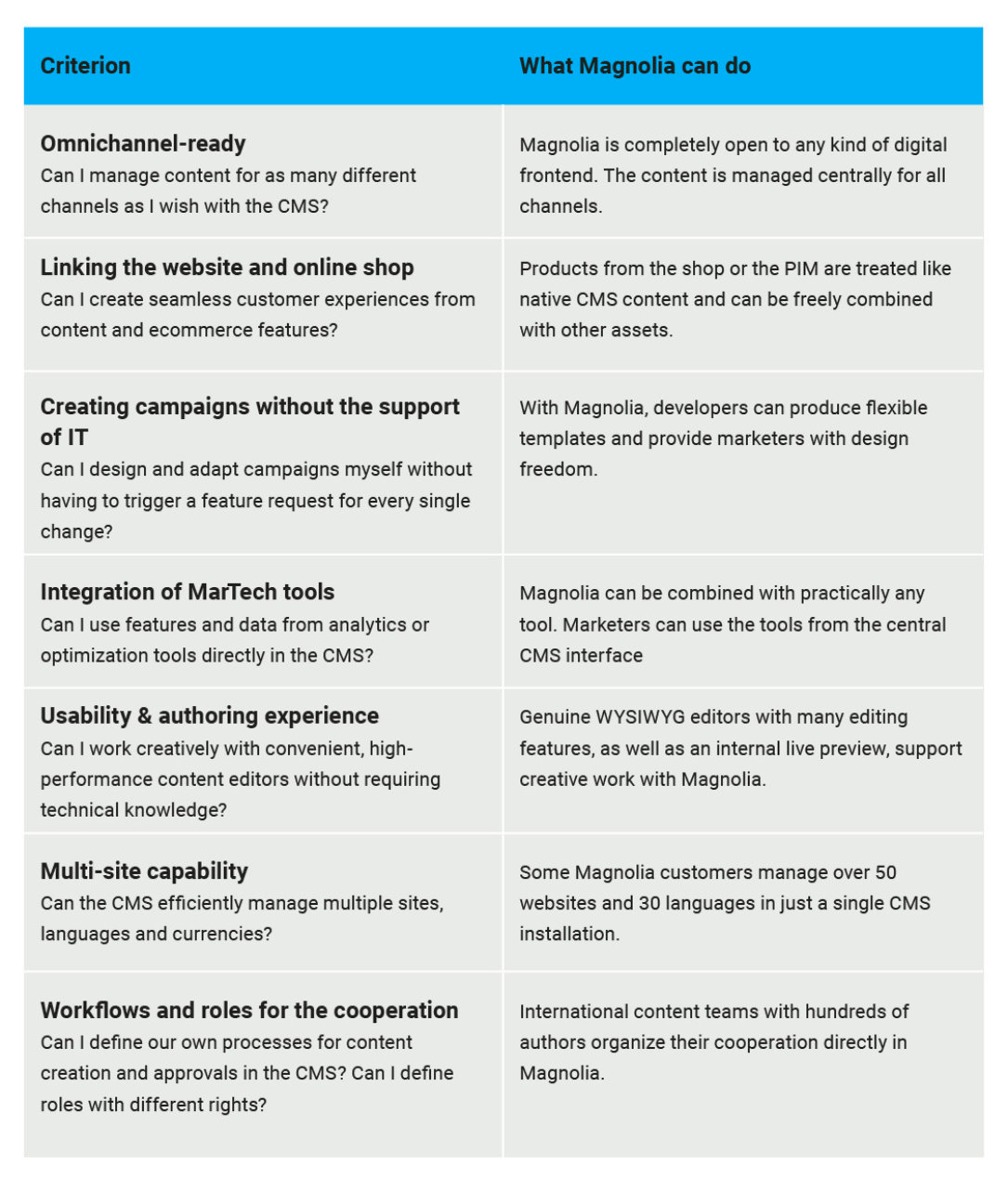- Jun 26, 2024
- 6 min
7 Things B2B Marketers Need From an Ecommerce CMS
Magnolia in action
Take 12 minutes and a coffee break to discover how Magnolia can elevate your digital experience.
Global B2B buyer behaviors are changing rapidly, from what they expect when making purchases for their businesses to how they discover and research products. To increase their company’s ability to compete and thrive in this remote-first world, B2B marketers need the right ecommerce CMS and tools.
As B2B customers are increasingly comfortable turning to digital channels to meet their purchasing requirements, a B2B ecommerce CMS must allow marketers to create the buyer journey they need and expect. Therefore, an ecommerce CMS must possess essential capabilities like omnichannel publishing, seamless tool integrations and an integrated content hub to allow marketers to meet the buyers’ expectations.
With its best-in-class Headless CMS, Connector Packs, and Headless Accelerator, Magnolia enables B2B marketers to seamlessly integrate content and commerce, meeting the evolving demands in B2B sales.
Many of us order something from Amazon and expect to get it in a day or two. Sometimes, even in a few hours, depending on what we’re ordering and where we live. It’s hard to turn off that expectation for convenience when shopping for anything online since, after all, we’re the same person whether we’re at work or at home.
So why should B2B buyers be any different?
By 2028, Forrester forecasts that global retail e-commerce sales will grow to $6.8 trillion and capture 24% of global retail sales. The growth of ecommerce has been unprecedented in recent years, and part of the reason for this growth has been the blending of content and commerce.
Companies rely on content marketing initiatives to drive interest and increase conversions. The blending of content and commerce is a key component of a successful ecommerce strategy, even one targeting B2B buyers.
Most B2B sales interactions between suppliers and buyers are shifting to digital channels and today’s B2B customers have high-expectations from suppliers: more channels, more convenience, and a more personalized experience.
With the digitally enabled model of selling on the rise, B2B marketers need access to the right tools to execute these sales strategies. A modern B2B ecommerce CMS can help, but how do you pick the right one? Don’t worry; we have a few details to help you figure that out, plus a handy checklist at the end.
Learn more about the benefits of content marketing in B2B ecommerce.
What Is a Modern Ecommerce CMS? (And Why Do Marketers Need One?)
A modern ecommerce CMS enables marketers to create, edit, publish and manage content as part of a seamless shopping experience. That means handling blog updates, product descriptions, and other standard requirements of a content management system. In today's digital landscape, where the buyer's journey spans multiple devices and demands personalized interactions for every customer at every touchpoint, more than simply handling content publication is required.
Marketers also need an ecommerce CMS to help them overcome many of the challenges they face on a daily basis as B2B customer expectations change. Some of these challenges include:
Digital channels dominate other sales channels, and there is an ever-increasing number of channels where they need to publish content,
Customers want their buying experience to be at the same level as their B2C experiences,
There is a growing complexity of modern software stacks.
To overcome these challenges and more, there are certain things that marketers will need from their ecommerce CMS.
7 Things Marketers Need From an Ecommerce CMS
1. Omnichannel Publishing
Today’s customers aren’t only shopping on one channel, and consequently, marketers can’t afford not to publish where their customers are going.
In 2016, B2B decision-makers used up to five channels to interact with suppliers, but now the number of channels they use during their decision journey exceeds 10, with six of them being digital channels.
Thus, an ecommerce CMS needs to support content publishing on more than just a brand website or ecommerce shop. It also needs to allow marketing campaigns to be spread across multiple channels, including social media platforms and digital marketplaces. These campaigns also need to be connected, allowing customers to switch channels effortlessly without feeling like they’re interacting with a different brand.
2. An Integrated Content Hub
Managing content on multiple channels takes a lot of effort. Marketers need a CMS that acts as an integrated content hub, allowing them to see how content looks on each channel and how it’s all linked together, all from one central location.
B2B Ecommerce - Achieving Cross-Team Success with the Right CMS
Find out how you can successfully meet the challenges of modern B2B commerce across teams - with the right CMS.
3. Freedom From Developers
Modern ecommerce campaigns are fast-moving. Landing pages and promotions need to be launched quickly and still adjusted for different audiences. In order to achieve the level of speed required, marketers need to be able to do things without bothering developers to help them. Creating landing pages, implementing SEO, and making updates to content need to be done independently.
4. Easy Tool Integrations
It takes more than just a CMS to run an ecommerce store. Analytics tools, A/B testing, personalization engines, and more are also components of an ecommerce software stack and are often used by B2B marketers to create the best campaign and increase conversions. A B2B ecommerce CMS needs to be able to integrate with these other tools so that marketers can gather relevant data from them and use it to improve their content marketing efforts.
Learn more about how to integrate your CMS and your ecommerce platform.
5. User-friendly Authoring Experience
B2B marketers need an intuitive authoring experience. They need WYSIWYG editing and drag-and-drop functionality that enables them to move components where they need to go.
6. Ability to Manage Multiple Sites and Locales
B2B marketers often cater to multiple markets and audiences located in different regions and countries worldwide. With audiences that speak different languages and have unique cultural preferences, marketers need to be able to adjust things accordingly. This might also include managing microsites that share similar content without duplicating that content unnecessarily.
7. Streamlined Workflows and Collaboration
With multiple teams working together and multiple campaigns going on simultaneously, marketers need access to a CMS that can allow them to define the best workflows for their needs so that content gets approved correctly and errors can be spotted quickly before any damage is caused.
Magnolia: Catering to Marketer’s B2B Ecommerce Needs
The modern B2B marketer needs a CMS that enables them to publish content onto multiple channels, integrate with additional tools, view everything in one place, and manage campaigns without overreliance on IT.
The solution to these challenges and the provider of everything these marketers need is a digital experience platform (DXP). Magnolia’s DXP includes a headless CMS that sits at the heart of the platform and supports B2B marketers with their commerce needs, allowing them to blend content and commerce.
Magnolia allows marketers to create content once and publish it wherever they want, allowing them to quickly spin up campaigns and generate revenue. By effortlessly integrating with other ecommerce tools, Magnolia also provides unified customer data that gives a 360-degree view of customers, allowing marketers to personalize campaigns, quickly send campaigns to market and manage multiple sites and brands.
How Magnolia supports brands with their ecommerce CMSes
Sainsbury’s digital team works together to support over 1,500 stores and record numbers of online deliveries. With a growing digital presence that includes Sainsbury’s Groceries Online, Argos, Tu clothing, and Habitat, Sainsbury’s needed to ensure that its digital customers experience a seamless, easy, and convenient shopping journey.
After acquiring Home Retail Group, Sainsbury’s needed one tool to help them efficiently manage multiple brands and technologies. Magnolia provided the author-first approach their marketers needed to create an engaging customer experience across multiple channels. Since implementing Magnolia, they have reached their critical KPIs without additional costs.
.png)
For businesses that want to achieve similar results as Sainsbury's, their ecommerce CMS must check all the right boxes. The checklist below can help you ensure your ecommerce CMS has all of the necessary capabilities:










